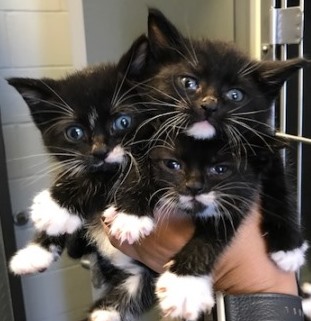The capture, impounment and eventual destruction of unwanted animals costs taxpayers and private humanitarian agencies over a billion dollars each year. As a potential source of rabies and other less serious diseases, they can be a public health hazard.

REDUCES PET OVERPOPULATION!
Having your pet sterilized is the best way to do your part in the fight against pet overpopulation, which is a huge problem around the world. According to the World Health Organization there are more than 200 million stray dogs worldwide. Dosomething.org states that ‘it’s impossible to determine how many stray dogs and cats live in the United States‘ estimates for cats alone range up to 70 million. The International Animal Health Journal, research shows that the U.S. alone has 30 million puppies and kittens born yearly. That is seven pets born to every human born, with only one out of 10 finding a forever home. Their studies also show that approximately 6 to 8 million dogs and cats enter shelters each year with only 24.9% of dogs and 23.4% of cats being adopted. In 2017 the ASPCA reported that an estimated 1.5 million companion animals are euthanized in U.S. shelters every year.
A study by the University of Appalachia (North Carolina), showed one unaltered female dog and her offspring can produce 67,000 puppies in a 6 year period. While, in a 7 year period, one female cat and her offspring can produce a staggering 370,000 kittens.

BENEFITS OF SPAYING (females)
Unspayed Females will have heat cycles, the frequency and duration of a cycle varies by breed and species. Unless spayed, pets can continue to have heat cycles for their entire life! When your pet is unspayed, males will be wildly attracted to them and will do just about anything to get to a female in heat! A female left outdoors, unattended can easily become impregnated, causing unwanted litters.
Canines will go into heat up to 3 times per year and can be in heat for up to 3 weeks! Heat cycles in dogs can be very ‘messy’ and have a foul odor. Sanitary pads for dogs can be hard to keep on and if not changed regularly these can cause urinary tract infections. Leaving her outside will only cause issues with area dogs. Which will usually result in her getting pregnant by a stray.
Felines will have a heat cycle every 3 weeks lasting up to 5 days during the breeding season (typically from January thru July). When a cat is in heat she will howl and urinate to attract males. A female cat in heat will become overly affectionate, demanding attention at all hours of the day and night. Male cats outdoors can smell a female cat that is indoors, they will start to ‘mark’ the area around the home. Urinating in the shrubs and around the doorway.
Having your cat or dog spayed will increase her chances of having a healthier, longer life! There are many illnesses that can be prevented by getting your pet spayed as early as possible. Research shows that dogs spayed before 2 years of age live 45% longer that unaltered dogs.
Ovarian and/or uterine cancer is reduced or eliminated simply by having your pet spayed. Cancer is never easy and can be expensive, as well as painful for your pet! Although ovarian and uterine cancer is rare in dogs and cats, the average cost of treatment is $6,500.00
The risk of mammary tumors in dogs can be significantly reduced if spayed before the first heat cycle. Mammary tumors in dogs are found more often in unspayed females or females spayed after 2 years of age. When a dog develops a mammary tumor, it is 45% more likely to be cancerous, this being the most common cancer in dogs. Cats spayed before they are 6 months of age are 7 times less likely to develop mammary tumors. As much as 85% of cats with mammary tumors will be cancerous. The cost of treatment for mammary tumors varies and depends on severity of the tumor however; the average cost for a dog is $5,500.00 and the cost for cats average at $4,000.00.
Spaying your pet reduces the risk of a serious infection called pyometra. This infection is a result of hormonal changes in unspayed females and can be life-threatening! Approximately 1 in 4 unspayed females will develop pyometra, causing the uterus to fill with pus. In some cases, the uterus can actually rupture, causing the infection to spill into the abdominal cavity. A pet with pyometra will need to be spayed if IV antibiotic are not working. In severe cases, a spay may be the only option in order to save her life. Unfortunately, with older dogs the surgery can be dangerous, especially when the pet is already dealing with an illness like pyometra.
Unspayed females may have false pregnancies and although this is not a life threatening illness, it can be highly stressful for you and your pet. Many females with false pregnancy have a higher lever of anxiety and can even have changes in mood/temperament. She may begin treating toys as if they are her babies. She will become attached to these toys and can become upset if a toy is missing or if she is away from them too long. The average cost to treat a false pregnancy is $250.00. However; if the pet is not spayed after a false pregnancy she could have future false pregnancies.

BENEFITS OF NEUTERING (males)
Your male dog and/or cat will be less likely to wander away from home! According to Webmd and the ASPCA, intact males will do just about anything to find a mate. This includes digging under the fence, darting out the door or even jumping out the window of a moving vehicle!! When a pet is neutered it reduces the breeding instinct making them more content to stay home and less likely to roam. According to Dog Behaviorist, Dr. Nicholas Dodman, neutering reduces roaming in 90% of males. When an animal is roaming they are at risk of many dangers including fights, attacks by other animals or even getting hit by a car! Studies show that as many as 85% off all cats and dogs killed by cars each year are unaltered.
By neutering your dog, the testosterone levels will be lowered. This will help with certain types of aggression, such as dog to dog aggression for breeding rights. Studies have shown that having your dog neutered will decrease many aggressive behavior, as well as reduce the number of dog bites. According to the Humane Society of the U.S, intact males are involved in 70 to 76% of bite incidents. They also state that intact males represent 90% of the dogs presented to behaviorist for dominance aggression. Always keep in mind that neutering is not a cure-all for behavioral issues! Certain behaviors will not be fixed by neutering! However, neutering before sexual maturity can greatly curb certain types of aggression. Like Dogs, male cats will fight each other for breeding rights. Bite wounds to intact male cats can develop into abscesses that require veterinary care. At times these wounds can become fatal! Unaltered male cats can also be extremely vicious when defending their territory! Getting your cat neutered can effectively reduce aggression by 80-90%! Getting your cat neutered before sexual maturity is always the best option!
Unaltered male pets will instinctively spray their strong-smelling urine on objects including furniture, drapes and walls. This is their way of letting other males know that they have claimed the area as their own. They also spray to let females know that they are ready for mating. By getting your male neutered young, you can help prevent this behavior. If your pet has already started to spray getting them neutered will help. As many as 50-60% of male dogs will stop urine marking, or at lease do it significantly less often, after being neutered. 90% of cats will stop marking once neutered.
Getting your male dog or cat neutered will offer him several benefits, including the chance at a longer, healthier life! Altering your dog will increase his lifespan by 1 to 3 years on average, your cat will live an average of 3 to 5 years.
Testicular tumors are considered one of the most common tumors in unaltered males. They can occur in intact males of any age and breed and account for 90% of all cancers originating from the male reproductive system. Treatment costs for cancer will depend on the severity and type of cancer, as well as the treatments used. According to ‘Pet Insurance Quotes‘, a pet owner can easily spend between $5,000 and $20,000 on cancer treatment.
Benign Prostatic Hyperplasia (BPH) is a non-cancerous enlargement of the prostate gland and is the most common prostate disorder in intact male dogs, but rarely seen in male cats. Symptoms include straining to urinate and blood seen in the urine. Dr. Karen Becker states that it is estimate that nearly 50% of intact male dogs will develop BPH with in the first 5 years, 60% by age 6 and 95% by the age of nine! Treatment for BPH depends on the severity, but neutering will completely resolve the issue and is the easiest and quickest treatment. BPH may affect your dog’s bowel movements and/or urination. The cost to treat your dog’s enlarged prostate will vary depending on the type and cause of condition as well as choices you may make in treatment. Overall costs will range from a low $250 to a high of $8,000, with a national average of $4,246!
People have many misconceptions on Spay/Neuter and often are misinformed. Here are just a few of the many myths that we hear on why owners have kept their pet intact.
The weight of your pet is determined by the amount of food eaten as well as the exercise you provide. Be sure to feed a nutritious, high-protein meal in appropriate portions. Also, provide plenty of opportunity for exercise and regular play periods!
If you want your children to see baby animals being born, talk to a local farmer or find a movie. You could even become a foster parent for a local shelter or rescue that needs help with pregnant animals. This is a much better option and a great way to teach them how to be a responsible pet owner.
Properly taking care of a litter of puppies and/or kittens is far more expensive than the cost of surgery. Not to mention there are many low cost options available!
The changes you will see in your pet will be positive, such as no more urine sprayed on the walls. However, the loving, social pet you have before surgery will still be there after surgery. They will still want to play and will still be just as good at things like hunting. The personality of our pets are primarily due to genetics and socialization.
Unlike humans, pets don’t have egos and won’t suffer an identity crisis because they have been neutered. Instead they will be more relaxed, less frustrated and overall a happier and healthier pet!


